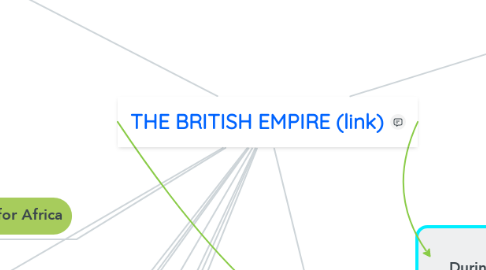THE BRITISH EMPIRE (link)
by Cecilia Villegas

1. BRITAIN EXPANSION (link)
2. India
3. The Scramble for Africa
4. In 1857, the East India Company disbanded and the British governmt took direct control of India
5. In 1853, Railways enabled goods and people to travel faster than ever before
6. Middle-class Indians formed the Indian National Congress
7. In the late 1880s, the British sought to expand their empire into Africa but they faced competition from other European powers.
8. In 1884-5, the German leader Otto Van Bismarck held the Berlin conference to resolve tensions within Europe.
9. At this conference Africa was divided. Britain gained control of Nigeria, the Gold Coast, Rhodesia, South Africa and Egypt.
10. The Berlin Act was signed by 13 European countries.
11. It stated the protection of old markets and the explotation of new ones.
12. It also included the objective of helping in "suppressing slavery"
13. As a consequence, Britain occupied or annexed Egypt, Sudan, British East Africa (Kenya and Uganda), British Somaliland, Southern and Nothern Rhodesia (now Zimbabwe and Zambia), Bechuanaland (now Botswana), Orange Free State and the Transvaal (South Africa), Gambia, Sierra Leone, Nigeria, Ghana and Malawi.
14. EGYPT: Britain took full control over Egypt in 1882. In 1914, it became its protectorate. Due to Egypt is near the Suez Cannal, it allowed for a trading route from Africa to Asia.
15. Explorer David Livingstone promoted to defeat the slave trade controlled by Arabs in East Africa through the "3 C's: Commerce, Christianity and Civilisation".
16. After the second world war II (1945) the British Empire went in decline
17. A process of descololnization began with the independence of India
18. In 1947 the independence of India and Pakistan were followed by Ceylon
19. ENGLISH LANGUAGE V - 2020 *MOLINA, Nadia *OVALLE, Antonieta * RUEDA , Veronica *TOLABA, Gisel *ZELARAYAN, Facundo
20. The last significant British colony, Hong Kong, was returned to Chinese sovereignty in 1997
21. AMERICA DURING BRITISH EMPIRE
22. 1620: The first PILGRIMS arrived to Northeast of America.
23. A following vawe of explorers arrived later. (as John Smith).
24. 1776 : USA independance . Benjamin Franklin, Thomas Jefferson.
25. South America was under control of European Countries : Spain, Portugal, and others.
26. 18th century : The idea of independance arrived to South American lands. The viceroyalty was disolved.(1810 Independence of Argentina )
27. AMERICA was inhabited. It was then colonized.
28. During the Victorian period
29. Britain controlled ¼ of the world’s land area and ruled over 400 million diverse peoples
30. The Victorian Era (1837 -1901)
31. It was a period of tremendous change. Britain became the most powerful country of the world.
32. 10 EVENTS FROM THE VICTORIAN ERA (link)
33. INDUSTRIAL REVOLUTION :technological, socioeconomic, and cultural changes (link)
34. The Settler Colonies
35. Decline of the British Empire
36. Britain governed CANADA, large areas of INDIA, AUSTRALIA, and NEW ZEALAND, and small parts of South America and Africa.
37. Britain acquired the Cape of Good Hope Colony at the southern tip of Africa in 1815 and annexed the adjacent coastal region of Natal in 1843.
38. The independence of Burma in 1948 and Ghana was the first Sub Saharan coolony to reach independence in 1960
39. Throughout the 19th century British settlers were outnumbered by both Africans and the descendants of the original Dutch settlers of the 17th century, known as Boers (farmers).
40. The second Boer War started very badly for the British and revealed the limits of British military might in its extended empire. But eventually the superior numbers of the British Army wore the Boers down.
41. The notion of independence spread in the colonies of Africa, Asia and the Caribbean after 1960
42. The war had made it more difficult for Britain to maintain its empire. The war drained Britain financially and also lowered its prestige in the eyes of its colonies.
43. Britain had long been encouraging a union of the four South African colonies. In 1908 white delegates sent a draft proposal for union to the British Parliament, which hurried through the South Africa Union Bill in 1909.
44. Statute of Westminster: (1931) declared that the self-governing dominions were to be regarded as “autonomous communities within the British Empire, equal in status
45. The Union of South Africa formally came into being in 1910, becoming a member of the Commonwealth in 1931, leaving in 1961, but rejoining in 1994 after the end of apartheid.


